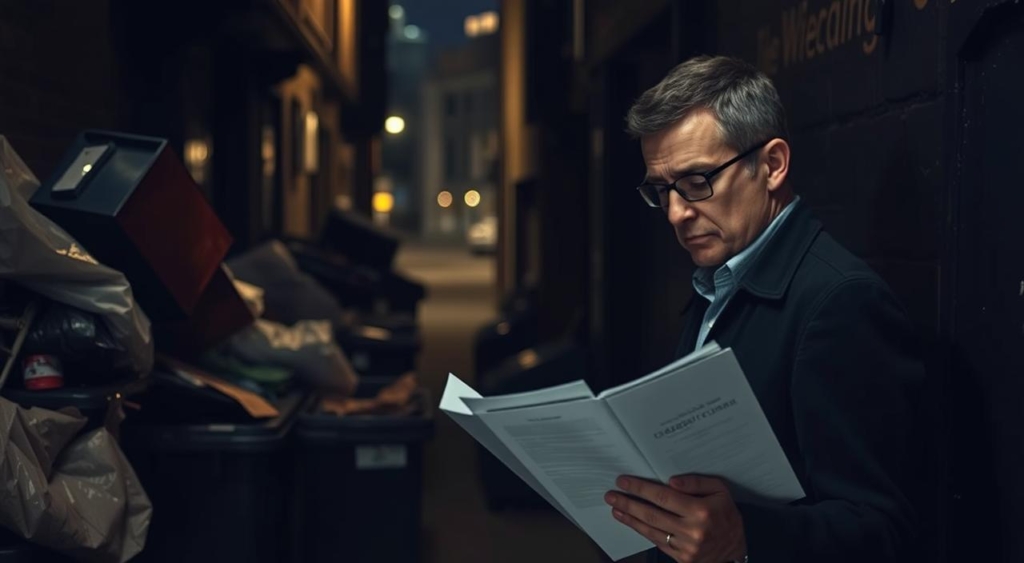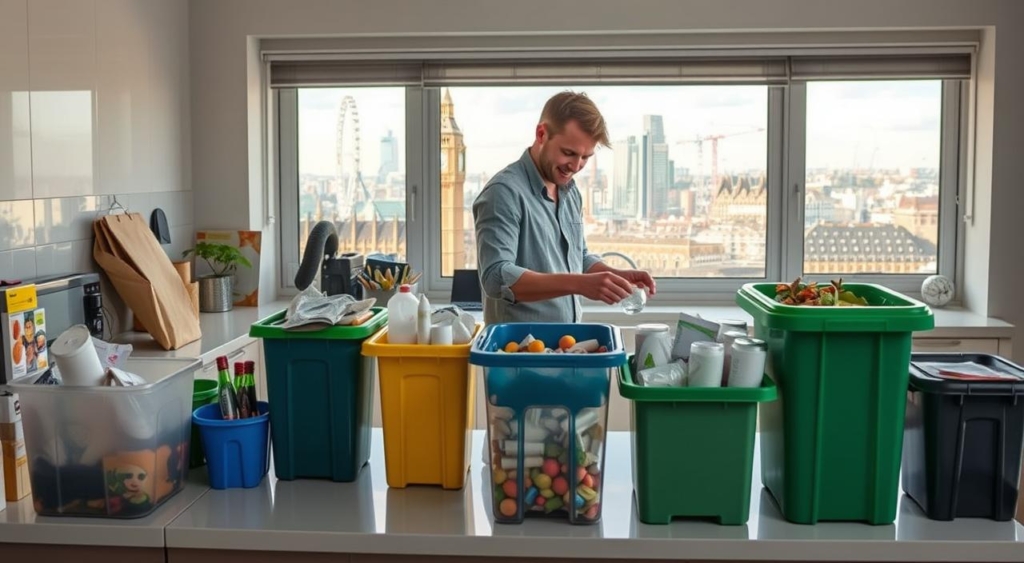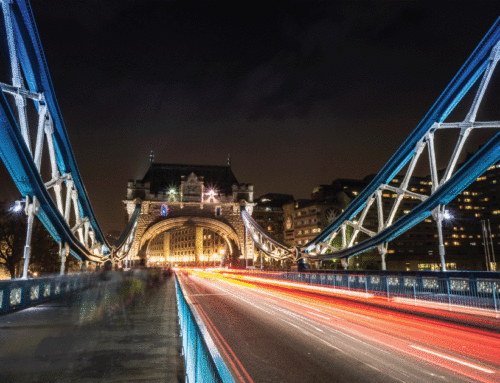London’s waste disposal rules are changing. It’s important for everyone to know these new laws to avoid fines.

The new rules are part of the Waste Management Regulations2025. They aim to make waste handling better in the city. Knowing these changes is key to avoiding fines.
London is moving towards a greener future. Knowing the updated waste disposal rules is not just about avoiding fines. It’s also about helping make the city cleaner and healthier.
Key Takeaways
- Understand the new waste disposal laws to avoid fines.
- Familiarise yourself with the upcoming waste management regulations 2025.
- Ensure your business or household is compliant with London’s latest waste disposal rules.
- Stay informed about the changes in waste handling practices.
- Contribute to a cleaner London by adhering to the new guidelines.
Overview of Waste Management Regulations2025
London is introducing new waste management regulations in 2025. These aim to boost recycling and cut down waste’s environmental harm.
Key Changes in London’s Waste Disposal Framework
The new rules bring big changes to waste management in London. Two main changes are new separation rules and digital tracking.
New Separation Requirements
People and businesses must sort their waste into different types for better recycling. The types include:
- Organic waste
- Recyclable materials
- Non-recyclable waste
Digital Tracking Implementation
A digital system will track waste disposal and recycling. It will spot where things go wrong and help improve waste management.
Timeline for Implementation and Compliance Deadlines
The Waste Management Regulations 2025 will be introduced in stages. Here are the key dates and deadlines:
| Milestone | Date | Description |
| Regulations Published | January 2025 | Official publication of the new regulations |
| Public Awareness Campaign | March 2025 | Launch of public awareness campaign to educate residents and businesses |
| Full Implementation | June 2025 | All aspects of the regulations are in effect |
| First Compliance Check | September 2025 | Initial assessment of compliance with the new regulations |
The new rules are a big step for London in managing waste better and reducing harm to the environment. By following these changes, everyone can help make London more sustainable.
Who Will Be Affected by the New Regulations?
London’s stricter waste control measures will affect many. The new rules aim to make waste management sustainable across the city, impacting various groups.
Residential Property Requirements
Residents must follow the new waste sorting rules. They need to separate waste into recyclables, non-recyclables, and organic waste.
Commercial Business Obligations
Businesses must also comply with the regulations. They need to reduce waste and dispose of it properly. This might include waste audits and choosing approved carriers.
Landlord and Property Manager Responsibilities
Landlords and property managers must make sure their places have good waste management. They also need to tell tenants about the new rules.
| Stakeholder Group | Key Responsibilities |
| Residential Properties | Waste sorting, using designated bins |
| Commercial Businesses | Waste audits, approved waste carriers |
| Landlords/Property Managers | Providing waste management facilities, tenant education |
By knowing these roles, Londoners can follow the new rules. This helps make waste management better for everyone.
Understanding the Penalty System for Non-Compliance
To avoid fines, it’s important to know London’s waste rules. The penalty system aims to make people follow the new rules.
Fine Structure and Amounts
Fines start low and get higher for more offences. For home waste, the first mistake might get a warning or a £100 fine.
Businesses face bigger fines, from £500 to £1,000 for their first mistake.
Escalation Process for Repeat Offenders
Those who keep making mistakes will get fined more. Homes might get fined up to £500 for more mistakes. Businesses could face fines up to £5,000 or more.
How to Appeal Incorrectly Issued Fines
If you think a fine is wrong, you can appeal. You need to write to the local authority and give them proof.
Step-by-Step Guide to Household Waste Sorting
Sorting waste at home is key to following London’s recycling rules. By sorting waste right, homes can help London’s waste management a lot.
Mandatory Separation Categories
Households in London must sort their waste into different groups. Knowing these groups is the first step to following the rules.
Recyclables, Organics, and General Waste
There are three main groups for sorting waste. Recyclables like paper, plastic, glass, and metal can be reused. Organics like food waste and garden trimmings can be composted. General waste includes things that can’t be recycled or composted.
Special Items Handling
Some items, like electronics, batteries, and hazardous waste, need special care. They shouldn’t go in regular waste bins and must go to special places.
| Waste Category | Examples | Disposal Method |
| Recyclables | Plastic bottles, glass jars, paper | Recycling bins |
| Organics | Food waste, garden trimmings | Composting or organic waste bins |
| General Waste | Non-recyclable plastics, sanitary products | General waste bins |
| Special Items | Electronics, batteries | Designated collection facilities |
Proper Container Usage and Placement
Using the right bins and placing them correctly is key for efficient waste collection. Homes should use bins for different types of waste. Make sure they are out on the right day for collection.

Collection Schedule Compliance
Following the collection schedule is important to catch the waste pickup. Know the days and times for your area. Make sure your bins are ready on time.
Commercial Waste Management Compliance Steps
London’s new waste rules mean businesses need a detailed plan to follow. They must handle waste properly to avoid fines and help the environment.
Conducting a Business Waste Audit
Start with a waste audit to meet the rules. This checks the waste types and amounts your business makes. It shows where you can improve and follow London’s waste laws.
Selecting Approved Commercial Waste Carriers
Picking the right waste carrier is essential. Choose one approved by London and who cares about the environment. This keeps you in line with the rules and helps the planet.
Essential Documentation and Record-Keeping
Keeping accurate records is crucial for following the rules. This includes:
Waste Transfer Notes
- Waste transfer notes are key documents. They show when waste is moved from your business to the carrier. They prove you’re following the rules.
Annual Reporting Requirements
- Businesses must report their waste management yearly. They need to give detailed reports on waste generation, disposal, and recycling to the authorities.
By taking these steps and being proactive, businesses can meet London’s new rules. They can also reduce their environmental impact and avoid fines.
Navigating London’s New Recycling Legislation
London’s recycling rules have changed with new categories and processing needs. This change is part of London’s effort to improve waste management and support sustainable practices.
Expanded Recycling Categories
London now has more recycling categories. This means more materials can be recycled. Everyone must sort their waste correctly to help recycling.
Processing Requirements by Material Type
Each material has its own recycling process. For example, plastics, glass, and paper are treated differently. Knowing these processes is key for recycling correctly.
Preventing Contamination in Recycling Streams
Contamination is a big problem in recycling. It’s important to know what to avoid and how to clean recyclables properly.
Common Contaminants to Avoid
Things like food residue, liquids, and non-recyclable items can ruin recycling. Make sure materials are clean and free from these to help recycling.
Proper Cleaning of Recyclables
Recyclables should be rinsed to remove any leftovers. For example, clean food containers before recycling. A quick rinse can make a big difference.
| Material | Common Contaminants | Cleaning Method |
| Plastic Containers | Food residue, liquids | Rinse with water |
| Glass Bottles | Labels, caps | Remove labels and caps, rinse |
| Paper Products | Food stains, plastic inserts | Remove contaminants, flatten |
Handling Hazardous and Special Waste Safely
Londoners now need to know how to safely get rid of hazardous waste. This means knowing what waste is hazardous and how to dispose of it.
Identifying Regulated Materials in Your Home or Business
Hazardous waste includes things like batteries, electronics, and chemicals. The first step is to find these items in your home or business. Then, separate them from regular trash.
Step-by-Step Disposal Procedures
To dispose of hazardous waste, follow these steps: 1. Separate hazardous waste from other trash. 2. Put hazardous waste in the right containers. 3. Call a licensed waste carrier for disposal.
Required Reporting for Hazardous Waste
Businesses must report on hazardous waste. Keep records of waste notes and annual reports. Following these rules helps reduce waste and avoid fines.
By following these steps, Londoners can handle hazardous waste safely and meet new regulations.
Mastering the Digital Waste Tracking System
London’s new waste rules introduce a digital tracking system. This system changes how we manage waste, making it more transparent and efficient.
Registration Process for Households and Businesses

To use the digital system, you must register. You can do this online through the London Waste Management portal. You’ll need to provide some basic information and estimate your waste generation.
After registering, you’ll get a unique ID. Use this ID for all waste disposal. It helps track waste from start to finish, ensuring everything is accounted for.
Using the London Waste Tracking App
The London Waste Tracking App makes managing waste easy. It lets you log waste, track collections, and stay updated on waste rules.
The app is available for iOS and Android. Use your registration details to access your account. This makes managing your waste records simple.
Troubleshooting Common Technical Issues
Some common problems with the system include login issues and trouble tracking waste. For help, check the FAQ on the London Waste Management portal or contact support.
Updates and education campaigns are planned to fix these issues. This will help the system work smoothly.
Implementing Sustainable Waste Management Strategies
Sustainable waste management is essential for London’s future. As the city grows, good waste management practices are key to keeping it clean and healthy.
Practical Waste Reduction Techniques
Reducing waste begins with making smart choices. Being aware of our shopping habits can greatly cut down waste.
Shopping and Purchasing Habits
Londoners can help by picking items with less packaging. Buying in bulk and avoiding single-use items also helps. Simple changes can make a big difference.
Packaging Alternatives
Choosing products with biodegradable or recyclable packaging is smart. Businesses can also help by using sustainable packaging. This reduces their environmental impact.
Reuse and Repurposing Options in London
London has many ways to reuse and repurpose items. From charity shops to online platforms, there are plenty of options. Giving old items a new life helps reduce waste and supports local communities.
Community Resource Sharing Programmes
London’s community resource sharing programmes are growing. They let people share tools and resources. This not only cuts down waste but also builds community spirit.
By adopting these strategies, Londoners can make their city greener. They will follow the latest waste rules and improve life for everyone.
London-Specific Resources and Support
London has many programmes to help with the new waste system. These resources aim to assist both individuals and businesses in following the latest rules.
Borough Council Assistance Programmes
London’s borough councils offer help with waste sorting and collection. They also support understanding the new rules for residents and businesses.
Educational Workshops and Materials
Workshops and materials are available to teach about the new waste rules. They cover topics like proper sorting, recycling, and using waste facilities correctly.
Professional Waste Management Consultants
Businesses and large complexes can get advice from waste management consultants. They offer tailored advice on sustainable practices and following the new rules.
Conclusion: Adapting to London’s Evolving Environmental Policies
London’s environmental policies are changing, and it’s important to keep up. By using effective waste reduction strategies, we can lessen our impact on the environment. This also helps avoid fines for not following the rules.
The new rules highlight the need for proper waste sorting, recycling, and safe disposal of hazardous materials. By embracing these changes and using tools like the London Waste Tracking App, we can help make London more sustainable.
Keeping informed about London’s environmental policies is key. It ensures we follow the rules and supports the city’s environmental goals. Together, we can make London cleaner and more sustainable for the future.







